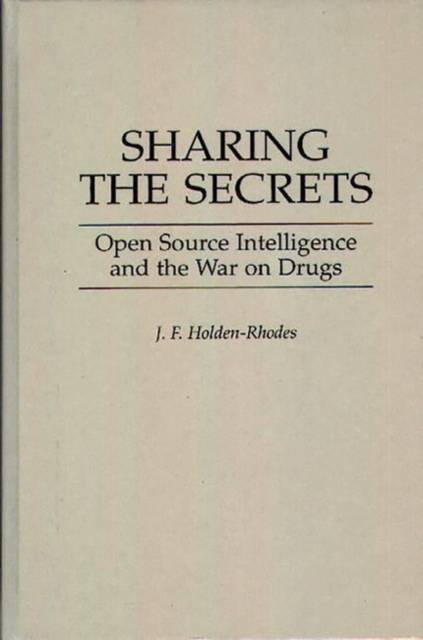
- Retrait gratuit dans votre magasin Club
- 7.000.000 titres dans notre catalogue
- Payer en toute sécurité
- Toujours un magasin près de chez vous
- Retrait gratuit dans votre magasin Club
- 7.000.0000 titres dans notre catalogue
- Payer en toute sécurité
- Toujours un magasin près de chez vous
Sharing the Secrets
Open Source Intelligence and the War on Drugs
Bruce Johansen
Livre relié | Anglais
161,45 €
+ 322 points
Description
Against the backdrop of U.S. drug policy and strategy, this important work, written by an experienced Intelligence and Special Operations Officer and Scholar, peels away the rhetoric to present an insider's view of cocaine trafficking in the Western Hemisphere. From the Huallaga and Chapare Valleys, through the cocaine transit countries to the U.S. border, this book compares and contrasts the enormous success of the traffickers to the monolithic U.S. drug policy that produces no end-game and conceals its failures behind a classified stamp. Drawing on his experience as the Counter Drug Intelligence Team Leader at Los Alamos National Laboratory and as a Black Hat Team member with the U.S. Southern Command, the author approaches drug trafficking from the narcotraficantes point of view to paint a picture that portrays the cocaine industry as it really is. Arguing that it is impossible to stop drugs at their source, the author builds a compelling case for shifting U.S. assets to the southern borders of the United States, through a strategy that causes the traffickers to pass through a series of obstacles designed to slow and impede their operations. Identifying drug trafficking as an examplar of the Gray Area Phenomena--the impact of non-state players and organizations on a post-colonial, multi-tribal world--the author brings a currency to his work using Open Source Intelligence as the vehicle by which the drug trafficking world may be assessed and analyzed. Sharing the Secrets offers an Intelligence for the new world disorder that enables decision-makers to recognize and define the new threats and suggests how realistic policy and strategy might be evaluated and re-cast. This work will be of particular interest to policy-makers, law enforcement and Intelligence professionals, and scholars as it opens the book to the right page and provides for the first time the stubborn facts that they may have been neglecting in the war on drugs. Sharing the Secrets is a body of descriptive, proscriptive, and prescriptive material that will enable serious public discusion to begin on national drug policy and strategy.
Spécifications
Parties prenantes
- Auteur(s) :
- Editeur:
Contenu
- Nombre de pages :
- 256
- Langue:
- Anglais
Caractéristiques
- EAN:
- 9780275954543
- Date de parution :
- 28-01-97
- Format:
- Livre relié
- Format numérique:
- Genaaid
- Dimensions :
- 162 mm x 243 mm
- Poids :
- 557 g

Les avis
Nous publions uniquement les avis qui respectent les conditions requises. Consultez nos conditions pour les avis.






